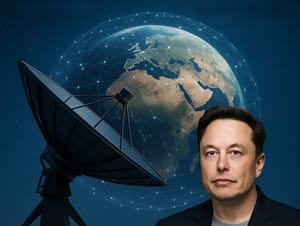There has been an ongoing debate about whether South Africa should bend its BEE rules to allow Elon Musk-controlled Starlink to have the right to provide satellite internet access in the country.
Oddly enough, I have previously argued both sides of this debate. Now, would you believe, I would like to argue a third option: not only should South Africa support Starlink, but it should go further and embrace the entire effort.
At first, I was pro-signup essentially for reasons of bridging the digital divide. Only 1.7% of rural households (and schools) have access to the internet. Here is a wonderful new technology that allows internet access to rural dwellers at a lowish cost but at very high speed. There is sufficient previous history of South Africa allowing BEE workarounds for tech companies for that problem to be solvable. And the idea of creating competition to fantastically expensive cellphone providers fills me with joy.
South Africa is a big, open country which is very dependent on foreign technology to participate in the huge boutique of digital offerings the new generation provides; some good, some bad, some indifferent. In a sense, non-participation is not only negative in a specific sense for the individual users, it’s also negative in a broader developmental sense for the country as a whole. It’s sensible to use international inventions to “leverage up” in the technological race when you are behind, as South Africa is.
Worse, not allowing Starlink to operate – even as every single one of our neighbours does – marks you as something of a technological troglodyte.
What could you possibly argue against that? Well, in some ways Musk himself answered that question. Pairing up with US President Donald Trump as effectively a member of the administration, and on top of that as an overt critic of South Africa, it seemed perverse to grant Starlink access to the very geography which was the subject of his ire.
And even more irritatingly, Musk was actively engaged in reducing the services and bonsellas granted by previous US administrations to the African continent. Of course, every administration has the choice of what gifts and deals it strikes with countries around the world, but Pepfar (the President’s Emergency Plan for Aids Relief) has been a fabulously effective and helpful charity.
It seems inevitable that projects like this have flaws, but Pepfar probably saved something like 25-million lives and helped bring HIV under control in countries like South Africa, Kenya and Uganda. So, at this point however useful the technology might be, granting access would just stick in the craw, and consequently, I changed my mind in favour of the “find another option” option.
So why change again?
Well, first, because Starlink itself has changed or at least clarified its own position. From being an implicit critic of BEE legislation, the group has now made generous offers precisely in order to satisfy the existing “equity equivalent” provisions that South Africa has already granted to other technology companies.
They are various, but the headline offer is that Starlink has publicly committed to investing R500m to connect 5,000 schools, benefiting 2.4-million schoolchildren with free internet access. To turn down this offer now would not only be self-defeating, but also churlish.
It’s one thing to reject the overtures of a company trying to engineer a legislative change, it’s another to reject the overtures of a company that is, for all intents and purposes, legally compliant.
Second, there are other aspects of this debate too. Some orbits, like high-inclination polar and sun synchronous orbits, are best launched from southern hemisphere coasts, including southern Argentina, Australia and South Africa. There has been some talk of using the Denel Overberg rocket test site for SpaceX launches and Starlink satellite deployments. That seems sensible to me as part of a larger arrangement to put on the table.
Even if launching from South Africa seems a stretch, satellites do need southern hemisphere monitoring, so South Africa could offer that too. For South Africa, this next-generation technology is obviously something the country would like to be part of, at the very least in a tangential way.
Who knows whether any of this is possible or not. But with some adept negotiating, there is a possibility now for a win-win outcome of this rather pointless debate. It helps that Musk has broken his link with the Trump administration, so he is not a state actor in the same way he was when he was associated with the department of government efficiency.
All this requires is some far-sightedness, quick action and a little getting over yourself. Are governments and billionaires good at that? Not so much. But one lives in hope. 💥
First appeared in currencynews.co.za here. Subscribe to Currency newsletters here.


Join the conversation